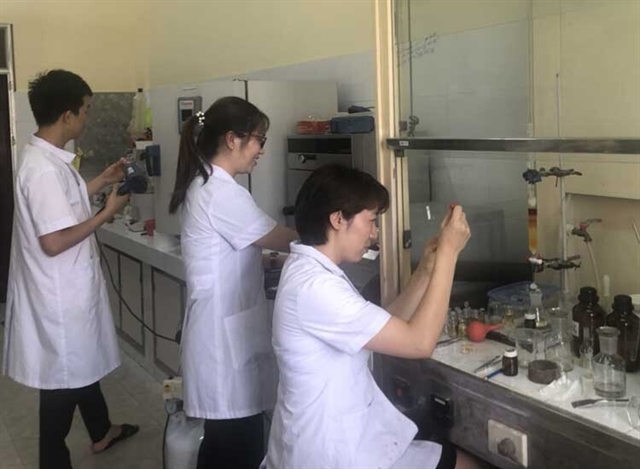 Society
Society

Researchers at the Institute of Chemistry under the Việt Nam Academy of Science and Technology (VAST) have found a way to shorten the synthesis process of Favipiravir - a COVID-19 antiviral drug.

|
| The research team at the Institute of Chemistry under Vietnam Academy of Science and Technology is working to synthesize Favipiravir. Photo courtesy of the VAST. |
HÀ NỘI — Researchers at the Institute of Chemistry under the Việt Nam Academy of Science and Technology (VAST) have found a way to shorten the synthesis process of Favipiravir - a potential COVID-19 treatment drug.
Scientific publications across the world showed that the synthesis process of Favipiravir requires seven to eight reactions but Vietnamese researchers are now synthesising it after just three in laboratory conditions using domestically available materials.
The shortened time could help lower production costs of the medication and help it further match with manufacturing conditions in Việt Nam.
Nguyễn Văn Tuyến, head of the Institute of Chemistry, said it has taken almost a year of hard work to get to this stage after beginning their studies last August.
"The team would continue to refine and stabilise the synthesis process while scaling it up. We expect to patent it," said Tuyến.
Favipiravil's mechanism is similar to Remdesivir, another antiviral medication.
Remdesivir has been used to treat the coronavirus in China, Japan and Russia. Favipiravir has also been authorised in Japan, India and Russia under emergency provisions.
It is now in its third phase of human trials in some countries with the number of volunteers ranging from 300 to 3,000 or more to evaluate the effectiveness and safety of the medicine.
Remdesivir has been used for COVID-19 patients with light or medium symptoms to prevent the further development of disease, help patients recover from the disease faster and reduce treatment time.
The drug also helps clear the virus, curbing infections in the community.
According to a publication by the UK’s University of Oxford in April this year, Favipiravir is an antiviral drug that has been licenced in Japan since 2014 to treat influenza. It works by inhibiting a viral enzyme called RNA polymerase, preventing viral replication within human cells. This viral enzyme is common to several viruses, including SARS-CoV-2, which causes COVID-19.
The drug has shown positive results against SARS-CoV-2 in laboratory and animal studies, with small pilot studies in humans demonstrating some benefits in reducing symptoms and the duration of illness. — VNS




